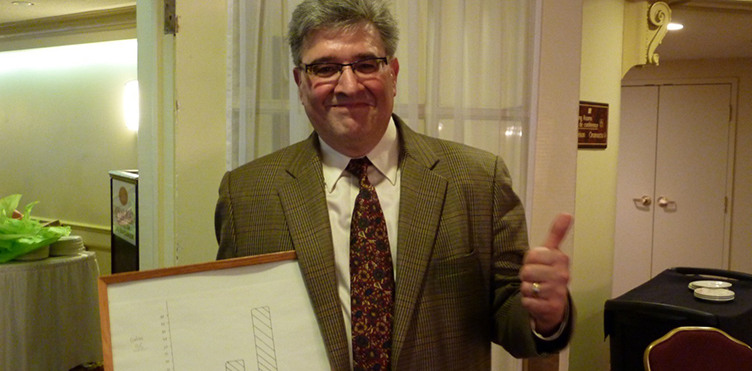
This fall, the UNB Law community said goodbye to Thomas Stephan Kuttner, who passed away in Windsor, Ontario, on October 2, 2024. A distinguished labour law expert, gifted musician, passionate traveler, and devoted advocate for the Jewish community, Prof. Kuttner is fondly remembered by colleagues and friends as a man of boundless talent and a heart of gold.
Prof. Kuttner grew up in Washington D.C. before coming to Canada as a young man to study at St. Michael's College at the University of Toronto. A four-time graduate of the U of T (BA, MA, LLB, LLM), Prof. Kuttner quickly established himself as an expert in labour and employment law. Teaching law was in his DNA, and he was proud to have been a third-generation law professor. During his 30-year tenure at UNB Law (1979 to 2010), he helped shape the minds of countless students through his lectures in labour law, administrative law, constitutional law, contracts, and Jewish law. A longstanding member of the Law Society of New Brunswick, Prof. Kuttner received his Q.C. in 2001. In 2010, he moved to the University of Windsor Faculty of Law, where he taught until 2020.
Remembering his former professor, colleague, and friend, retired UNB Law Professor David Bell (LLB’80) joked, “It’s fair to say that Tom’s classroom persona was not intense. For me as a student (late 1970s), his Labour Law class was where one might sit discreetly in the back and read the Globe & Mail. To his credit, it was only years later that Tom mentioned that my habit had not been as unobserved as supposed.”
Upon reading draft comments from David Bell about Prof. Kuttner’s ‘casual classroom persona,’ fellow retired UNB Law Professor David Townsend shared a memory of his own regarding his colleague's “legendary lateness.”
“Tom’s students had tracked, and then produced a graph (which the students had framed under glass), which depicted both the frequency and duration of the lateness of Tom’s arrival to start class over the students’ three years at UNB Law. When his UNB colleges held their fond farewell event for Tom, he brought that framed graph as one of his prized mementos of his time as a teacher at UNB Law.”
 Prof. Kuttner's impact on his colleagues extended beyond the classroom, as highlighted by Bell, who recalls his mentorship and intellectual breadth: “As I began teaching on a contract basis, he became my mentor and friend—polished, sympathetic, and engaging. He had begun life as a historian—I think his first article was on early 20th-century Turkey—and he was rounded intellectually in a way that stood out among faculty colleagues. In the days when the Law School was deciding whether its mission should be academic as well as vocational, Tom spoke up as an instinctive promoter of a broadened vision.”
Prof. Kuttner's impact on his colleagues extended beyond the classroom, as highlighted by Bell, who recalls his mentorship and intellectual breadth: “As I began teaching on a contract basis, he became my mentor and friend—polished, sympathetic, and engaging. He had begun life as a historian—I think his first article was on early 20th-century Turkey—and he was rounded intellectually in a way that stood out among faculty colleagues. In the days when the Law School was deciding whether its mission should be academic as well as vocational, Tom spoke up as an instinctive promoter of a broadened vision.”
Prof. Kuttner made significant contributions to Canadian labour and employment law. He wrote on topics including collective bargaining, expert tribunals, the industrial relations system, and workplace dispute resolution. His 1990 UNB Law Journal submission, Courts, Labour Tribunals and the Charter, was cited by the Supreme Court of Canada in Cooper v. Canada (Human Rights Commission). In 1998, he acted as solicitor for the intervener, the Canadian Association of Statutory Human Rights Agencies (CASHRA), in the SCC’s Vriend v. Alberta.
Prof. Rebecca Johnson (UVic), a former teaching colleague and friend of Prof. Kuttner credits his kind and welcoming nature with helping her grow both as an academic and as a person.
“Tom holds a place deep in my heart. He was an amazingly generous and kind person. I met him first as a colleague at UNB Law in 1995. He took me under his wing, and invited me, as a junior academic, to work with him on the CASHRA factum in the Vriend case. It was a gift—and transformative for me—in so many ways. I learned so much from him about thought, writing, activism and heart.”
Prof. Townsend also commented upon Tom Kuttner’s kind and generous nature. Prof. Townsend recounted a moment in the late 1990’s, when David was collaborating with a group of Engineering professors from other universities, one member of the research unit stopped in Fredericton, on his way to a conference, to relate that he was devasted because he had just been denied tenure at his home university.
“Learning that my college and friend was carrying a copy of his CV and his university’s Collective Agreement, I marched him down the hall to speak confidentially with Tom. After reviewing the collective agreement and the visitor’s record of scholarship, Tom asked to be left alone in his office for about 45 minutes. Tom reappeared with a fully drafted Notice of Appeal to be sent to the Tenure Review Committee and some very practical advice on how the appellant should first recast his record of scholarship. About one month later, it was learned that the Tenure Committee’s decision had been overturned, and that tenure had been granted.”
Prof. Kuttner was a former member of the Federal Public Service Staff Relations Board and the Government of Ontario Public Services Grievance Board. Locally, he was a well-known labour dispute arbitrator throughout the Atlantic provinces. He served many years as Vice-Chair of the New Brunswick Labour and Employment Board. In the latter role, he wrote many influential decisions, some of which continue to be cited today. For example, in a recent decision, the Board relied on his definition of the carpentry trade in an application for certification.
“Tom was a gifted mediator,” shared David Clark (LLB’82), a former student of Prof. Kuttner. “He had an incredible ability to make every person feel heard, respected and comfortable with the process, yet he was able to deliver tough messages in a non-threatening manner. Tom was able to facilitate parties finding common ground to resolve often difficult issues and, equally as important, to reset their relationship, as Tom always undertook to improve the union-employer relationship. At a mediation in Newfoundland involving 23 complex grievances that had been referred to arbitration, with multiple parties at each other’s throats, in two days, Tom facilitated a resolution of all of the grievances and a major positive reset of the relationship. That evening, a group of people, who at the start of mediation wouldn’t even speak to each other, were having dinner with Tom. Vintage Kuttner!”
Beyond the walls of the legal profession and academia, Prof. Kuttner led a fulfilling life marked by active community engagement and the pursuit of his many personal passions. As an advocate for the Jewish community, he engaged in issues related to justice, equality, and cultural preservation through his volunteer work with the Atlantic Jewish Council and the Canadian Jewish Congress. He was a life-long lover of classical music and played clarinet for over 20 years in the Fredericton Chamber Orchestra, where he also served as president. He enjoyed cooking and cuisine, was an avid reader, and loved intellectual discussion and travel including annual trips to Geneva and visits to many countries around the world.
“He was so much more than just a colleague,” adds Professor Johnson. “When Steve and I had our first child, Tom was a surrogate grandparent. Indeed, he taught us the football hold for our little one! He also supported me in continuing to move in the world, encouraging me to attend my first post-child academic conference with a newborn. He spent much of his time at that conference carrying my little person around so I could attend sessions. His love of his own children spilled into his interactions with the children of others. To his family, I am so grateful for the time I had with Tom and want you to know that he will continue to live in my heart. May his memory be a blessing to you.”
The entire UNB Law community shares its sincere condolences with his family, friends and colleagues.